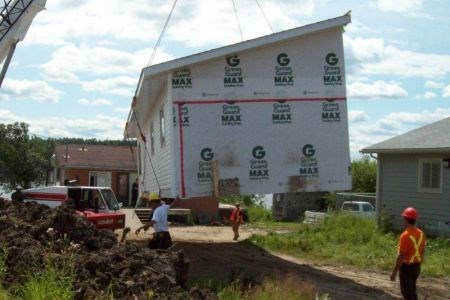The Wabaseemoong (Whitedog) Independent First Nations are enjoying an economic and employment boost brought on by the success of a joint venture with Kenora’s Moncrief Construction Ltd. to build modular homes.
Operating under the banner of Wincrief Forest Products – a joint venture between Wabaseemoong Independent First Nations and Moncrief Construction – the business is currently located in a 15,600-square-foot shop north of the Hwy. 17 bypass near Kenora.
Wincrief, whose majority owner is the Whitedog First Nations, recently purchased, renovated and equipped the plant, which is providing employment and affordable housing to the Whitedog communities. Support for the project has also come from the Ontario Ministry of Northern Development, Mines and Forestry. Of the 30 people currently employed by Wincrief, approximately half hail from First Nations communities.
Since opening in 2009, Wincrief Forest Products is experiencing considerable success and is looking forward to continued growth in partnership with the Whitedog First Nations, says Moncrief CEO Greg Moncrief.
He believes the company’s employees are the ones responsible for the venture’s success.
“They’re very talented - very hardworking,” says Moncrief of Wincrief’s workforce.
As a testament to their skill and dedication, the team has built 15 homes to date and is aiming to construct another five by the end of the year, he says.
A modular home is built in two halves, which are later transported and assembled on site and set on a foundation.
Several layouts are available, meaning Wincrief can design and build homes for families as well as singles.
Although they’re predominately meant for the First Nations communities, the homes are for anyone who needs one.
Company spokesperson Tannis Romaniuk says according to the Whitedog Chief Eric Fisher, unemployment in the community has dropped substantially in the past year. This is largely due to the jobs created in the plant, as well as the economic benefits realized by having more money flowing into the community.
“It allows them to provide for themselves and their community,” she says. “We’re looking at this as more than a business – we want this to be a driver for them.”
While most construction projects are hampered by the elements which wreak havoc on deadlines and productivity, Wincrief ’s indoor plant ensures work can be done year-round. In northwestern Ontario, Moncrief says being able to work without worrying about the weather is a huge plus.
It means faster and more efficient construction, resulting in a lower cost to the customer for a quality home that is built in a fraction of the time, he says.
The goal is for Whitedog First Nations communities to one day assume 100 per cent ownership of the company. Although Wincrief ’s modular home construction business is thriving, the second phase will see the plant develop the capacity for pole peeling, which is the removal of a tree’s bark so it can be used as a utility pole. The pole peeling operation is one of many initiatives the company is developing in an effort to increase Wincrief’s long-term economic viability and stability.
“We recognize it’s their backyard,” Moncrief says. “The opportunities in forestry should belong to them and we’re happy to be involved.”




